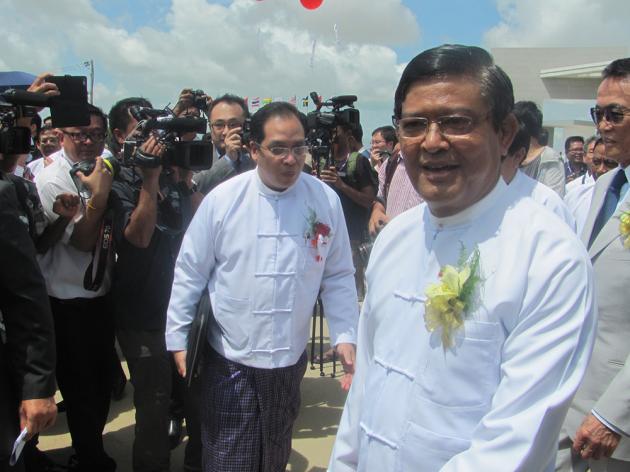Thilawa SEZ officially opened in 'first step' towards industrialisation in Myanmar

High-profile figures from Myanmar and Japan yesterday joined the grand opening of the Thilawa Special Economic Zone in Myanmar, hailing it as the first step in the country's path towards industrial modernisation.
Among them were Taro Aso, Japan’s deputy prime minister and finance minister; Yosuke Takagi, Japan’s minister for economy, trade and industry; and Myanmar Vice President Nyan Tun.
"Our ambition for Thilawa is far beyond other SEZs. In order to meet our expectations, we have come up with new concepts, new policies, and new ideas to create a favourable, friendly investment climate for both local and foreign investors," Nyan Tun said.
Set Aung, chairman of the Thilawa SEZ Management Committee and deputy governor of Myanmar’s central bank, said the government was making efforts to ensure that Thilawa SEZ can be the best example and model for all SEZs to follow.
"We are trying to make SEZs very different [from other industrial zones] and productive. We are making sure that all the SEZs will follow the Thilawa model and are going to be special as well," he said.
To date, Thilawa has welcomed 44 foreign companies from 12 countries and regions, including four from Thailand. Nearly half, 23, are from Japan. Others are from Taiwan, Singapore, Malaysia, Australia, mainland China, Hong Kong, Sweden, the United States, South Korea and Vietnam. This is on top of four Myanmar companies. Of a total of 48 companies, 37 are in the manufacturing sector.
So far, 13 companies have commenced construction in Zone A, which covers 396 hectares.
According to Win Aung, chairman of Myanmar Thilawa SEZ Holdings, the developer, once fully completed, Thilawa is expected to create about 40,000 jobs.
Myanmar plans three SEZs to draw foreign direct investment (FDI). Aside from Thilawa, there are two in Dawei and Kyaukphyu.
After construction work kicked off about two years ago, Thilawa’s Zone A is ready for plant construction and some plants are expected to commence operations this |year.
Japan has pledged to join the development of Dawei SEZ, which has been stalled for more than a year.
Nyan Tun said he had high hopes that Thilawa will bring responsible investments by international firms. He is also optimistic that the SEZ will bring anti-corruption practices to the long-isolated nation, as all the investors need to sign an anti-corruption agreement.
Missed opportunities
"We missed quite a few opportunities that other countries enjoyed. Now we are ready to take opportunities we missed. We have opened up the doors to all investors around the world. We want to grow together," he said.
According to Takagi, thanks to the provision of needed infrastructure such as electricity, water and transport linkages, as well as a one-stop service centre, the number of Japanese companies investing in Myanmar has risen. Win Aung said Thilawa SEZ would pave the way for strengthening Myanmar-Japan ties.
"It is just the beginning of realising our dreams. We will continue our efforts and drive for further success. I assure you [investors] that you will never regret [investing in Thilawa SEZ]," he said.
Yesterday, the developer – which is backed by such Japanese giants as Mitsubishi, Marubeni and Sumitomo corporations – signed a memorandum of understanding for the development of Zone B, which will encompass about 500-700 hectares. The new zone is planned to house industrial and commercial operations, as well as logistics infrastructure.
Taro Aso expressed his belief that Thilawa would become the main gateway for FDI into Myanmar, thanks to a rise in interest by Japanese firms and other Asian giants such as China and South Korea.
"In early 2013, I visited here [Thilawa SEZ]. At that time, there was nothing but empty land. I did not even imagine what we are seeing today," he said.





